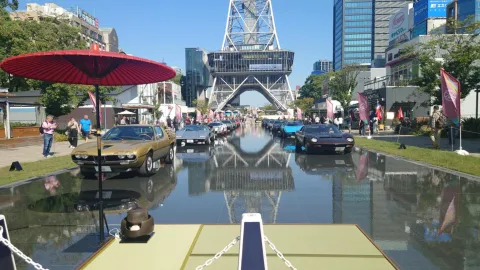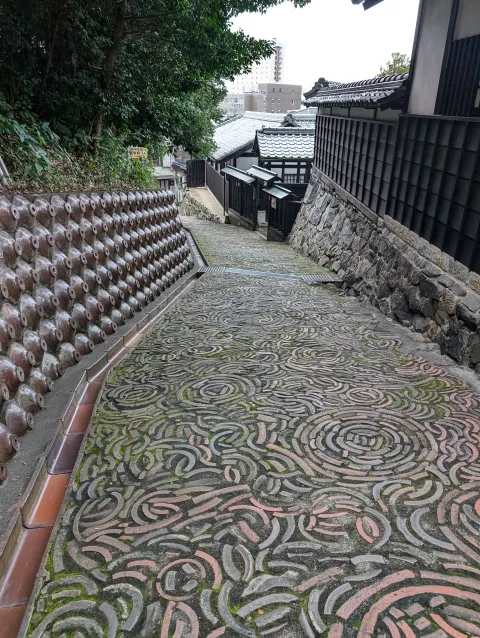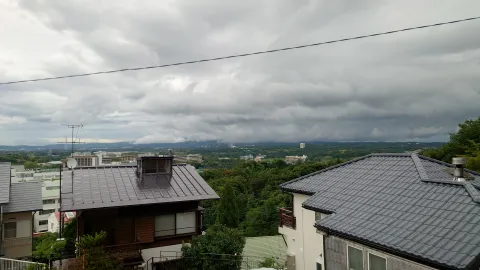Nagoya University of Foreign Studies
Nagoya University of Foreign Studies
Important Information
Semester Dates
- Fall: early September - early January
- Spring semester: mid March - mid July
Language
- English and Japanese
Website
For further information, visit the International Centre Office (SU060) or email outgoing@uleth.ca
Student Q&A
Did you experience culture shock during your exchange?
Yes
How did you overcome your culture shock?
I arranged to see counselling services- available through my host institution- as soon as I was able to. However, the pre-exchange sessions discussing what to be prepared for helped greatly.
What were the biggest cultural differences you experienced?
Affordable and easily available food, public transport, and healthcare. One of the more daunting things was suddenly not knowing how much or little eye contact to make with strangers.
What is the best form of transportation within the city?
The subway system. It's extensive, convenient, and runs consistently. It connects to overland trains and shinkansen to the entire country, and to various bus systems.
What was your favourite place to visit within the city?
Within Nagoya, I didn't spend much time- but the area between Nagoya Station and Sakae is incredibly popular- shopping, nightlife, museums, parks, shrines, and Nagoya Castle are all available here. I specifically enjoyed Osu Kannon streets and the Science Museum.
Were there any special events, festivals, or holidays in the city you would recommend others attend? Or anywhere you travelled to that you loved?
Yes. I went during Fall- there are many festival events occuring at this time of year. I went to the Osu Kannon festival. I also travelled to Tokyo and Kyoto, Inuyama, Isu, Seto, Tokoname, and Hiroshima. Tokyo, Kyoto, and Hiroshima were all interesting as larger cities with historical and cultureal things to expereince, but going to smaller towns yeilds much to learn, and nature to explore.
On average, what was the weather like?
It was hot until mid October- incredibly humid and sunny. I bought shorts and sunscreen and needed them daily. The weather cools from mid October forward, and by late Novemeber you can wear multiple layers and jackets. It never snowed, but rain is frequent, and it can get windy.
Additional comments about the city?
NUFS is located in Nisshin city, an outer area to Nagoya city itself. Some of my favourite visits were to shrine sites to the south of the dorm within Nisshin area, as well as walking the local streets and into the rural sections. There is a nearby historical castle as well. Finally, taking the bus to Fujigaoka Station- this station is a great area of karaoke, food, and drinks, as well as connecting to the Higashiyama line into Nagoya city.
Please list the furniture that was provided in your on-campu dorm.
A desk with file drawers and a shelf, curtains, a shelving unit, a closet, a bed (with two under-bed drawers), a garbage bin.
How long did it take to travel from your dorm to classes?
8-12 min.
Do you have suggestions for future students who are looking for accommodation?
The shared dorm experience was excellent, though I didn't enjoy the shared kitchen much as far as cooking went. This university offers single-style accomodations as well, but I found the Global Village to be homely, with a dorm manager and RAs to speak to, and other international students and a Common Room to hang out in.
Which company would you recommend students purchase a sim card/e-sim through?
I got a physical sim through Mobal- this was an excellent plan for cost, and saved me on more than one occasion when I needed mobile data for maps or translation. I had no issues that weren't resolved quickly through the company customer service, and I was able to cancel the SIM easily too. I had fewer issues than some of my dorm-mates who got e-sims that had problems, and there as one person who didn't get a SIM at all who had many issues for not getting one- which you need for banking setup.
Do you have advice for how students should handle banking in your host country?
The host university offered instructions on setting up the banking- go through Japan Post Bank. There is a physical location near the university/dorms, and while setup was difficult for me (my phone does not contain an IC card chip, which is highly utilized in Asian countries, so I could not use the banking app), once done it was easy to receive my scholarship, and closing my account at the bank was easy as well.
Please provide any additional suggestions regarding costs.
Students should be aware that the Student Services at NUFS offers shinkansen (bullet train) discount tickets. While you can purchase tickets online or through an app, this discount works only for going to Japan Rail kiosks manned by human associates. Additionally, students should set up an IC card for their local area- while the majority of cards work across the nation, a locally-oriented IC card ("Manaca" for Nagoya) may have access to a range of smaller rail and bus companies.
What would you suggest students pack before leaving Canada if they are studying at your host university?
Honestly, I found I overpacked, and it made getting in and out of Japan rather difficult. First, pack minimal clothes, as clothing is fairly affordable- new or from the multitude of thift shops. I had to buy new clothes anyway due to the weather/climate, and how my Canadian clothes got ruined in the different Japanese washing machines, which only use hot water and all clothes call for hang drying (the supplies for which are provided in the dorm rooms- a drying bar and clotheshangers). Many students also left their textbooks behind to purchase new ones at the school- I carried mine into the country, which was heavy. I would suggest bringing 2-3 days of clothes, prescription meds, and deodorant (esp. stick deodorant) as it's not sold in Japan. School supplies are cheap and easily available, so leave space for yourself to bring things back.
Any additional comments or suggestions for future students going to NUFS?
Be careful when going to beaches. There are no signs at the beach nor lifeguards, but jellyfish are present while the water is warm. I went swimming in October and was stung all over- repeatedly, and required medical attention. In a subtropical environment, there are also an abundance of spiders of varying types, centipedes, and mosquitoes. It will also rain a LOT while being humid- buy an umbrella and be prepared for other people to steal it.
What were the biggest cultural differences you experienced?
The level of respect people have for each other as well as the environment that they are in.
What is the best form of transportation within the city?
Bus and train.
What was your favourite place to visit within the city?
Sakae in Nagoya as well as Osu shopping street.
Were there any special events, festivals, or holidays in the city you would recommend others attend? Or anywhere you travelled to that you loved?
The Nagoya cultural festival was going on when I was there. It highlighted the very interesting history of Nagoya.
On average, what was the weather like?
Sunny and warm.
Additional comments about the city?
Compared to other cities in Japan, Nagoya is not a popular tourist spot, however it is still extremely interesting as well as one of the best cities to live in Japan I believe.
Did the university provide airport pickup upon arrival?
Yes
Was there a buddy program available?
Yes
Additional comments about your host university?
The Campus is surrounded by trees so the exterior and surrounding area is beautiful to walk too.
Were the following provided in your student dorm?
- Bedding - yes
- Shared kitchen - yes
- Pots, pans, utensils - yes
Please list the furniture that was provided in your room.
Single bed/ shelf for clothes / Desk and Chair
How long did it take to travel from your accommodation to classes?
5 Minute walk
Do you have suggestions for future students who are looking for accommodation?
NUFS has three accommodations for international students. I would recommend Global village.
Which company would you recommend students purchase a sim card/e-sim through?
I did e-sim with Airalo but NUFS has a sim card.
Do you have advice for how students should handle banking in your host country?
NUFS will provide you with a Japan post Bank account and Cash card.
What would you suggest students pack before leaving Canada if they are studying at your host university?
Pack light as its a warm country, even in December.
What were the biggest cultural differences you experienced?
Efficiency and public perception
What is the best form of transportation within the city?
TRAINS
What was your favourite place to visit within the city?
Sakae
Were there any special events, festivals, or holidays in the city you would recommend others attend? Or anywhere you travelled to that you loved?
Firework festivals, and school festivals! Hikone and Magome are very nice spots to visit.
On average, what was the weather like?
Very hot in September and then it cooled down as the season went on.
Additional comments about the city?
Incredible food, and everyone was so kind.
Did you have a favourite course you would recommend to future students?
Any Japanese language course.
Additional comments about your host university?
Incredible!
Do you have suggestions for future students who are looking for accommodation?
NUFS global village is such a great community to stay in!
Which company would you recommend students purchase a sim card/e-sim through?
Airalo!
Do you have advice for how students should handle banking in your host country?
Its all done through the University so no need to worry!
What would you suggest students pack before leaving Canada if they are studying at your host university?
Personal toiletries that you are used to.
Do you have any additional comments or advice for future students?
Don't be scared! Everyone is super kind!
What were the biggest cultural differences you experienced?
The political and economic state of the country.
What is the best form of transportation within the city?
Trains, subways
What was your favourite place to visit within the city?
Toyota Automobile Museum or Auto Galleria LUCE
Were there any special events, festivals, or holidays in the city you would recommend others attend? Or anywhere you travelled to that you loved?
Ena, Gifu is outside of the Nagoya area. During the fall, when the leaves are changing colour, it's beautiful.
On average, what was the weather like?
Hot until November. Even after, the weather was always warm.
Additional comments about the city?
Events are always ongoing. Try and go to as many as you can.
Did you have a favourite course you would recommend to future students?
Journalism
Did the university provide airport pickup upon arrival?
Yes
Did the university have a buddy program available?
Yes
How much cash would you recommend students bring when arriving?
You can use a VISA credit card in Japan. I'd recommend using that at the start, then finding a cash machine/ATM. The exchange rate is significantly lower doing it that way.
Which company would you recommend students purchase a sim card/e-sim through?
NUFS partners with SoftBank to provide a phone plan. However it takes a long time to set-up.
Please provide any additional suggestions regarding costs.
You can average $12-$15 per day on food. Transportation costs are low. If you want additional freedom, buy a bicycle. Groceries are surprisingly expensive, so for those on a serious budget it is cheaper to eat out.
What would you suggest students pack before leaving Canada if they are studying at your host university?
Small gifts.
Please feel free to add additional comments that you would like to share with future students going to NUFS.
Buy a mattress pad.
What were the biggest cultural differences you experienced in Japan?
I had not expected the need for absolute quiet in public transit.
What is the best form of transportation within Nagoya?
Bus and Train
What was your favourite place to visit?
My favourite place to visit was Osu Shotengai. It was a little far from the university, but it was awesome place roughly an hour away that had cute cafes, cool shops, and overall awesome atmosphere.
Were there any special events, festivals, or holidays you would recommend others attend?
I heavily recommend going to the summer festivals, while you’re there. I also recommend going to both a smaller and more local festival and one of their bigger ones, as they both give a very different experience.
On average, what was the weather like?
The weather is both hot and humid on average, so be prepared with a uv umbrella as they do help a lot. If it does also rain, the weather tends to be hot and humid still.
Additional comments about Nagoya?
The university isn’t located in Nagoya city itself, but closer to the suburbs, so the location for the university is both quiet and peaceful, yet you’re still close enough to the city that you can easily go there after your morning classes.
Did you have a favourite course you would recommend to future students?
I recommend you to take intercultural competence, while you’re at the university.
Did NUFS provide the following?
- Airport pick up upon arrival - yes
- Buddy program - yes
Were the following provided in NUFS's dormitory?
- Bedding - yes
- Kitchen facilities - yes
- Pots, pans, etc. - no
What furniture was provided in your dorm?
Bed, desk, drawers, chair, cabinets.
How long did it take to travel from your accommodation to classes?
5 - 10 minutes walk
How much cash would you recommend students bring when arriving?
$100 to convert in the airport, you can use your card in almost all places or simply get cash from the atm after, it’s a little hard to find money exchanges near the university or dorms and the bank charges fees.
Which company would you recommend students purchase a sim card/e-sim through?
Klook
Do you have advice for how students should handle banking in your host country?
Banking can only be done through Japan post bank. NUFS will tell students all the details and help them set one up.
Any additional suggestions regarding costs?
In the first couple of months, I had spent more on transportation as I was exploring a lot. I heavily recommend that you get day passes for Nagoya transportation, if you’re going to be in the city for the full day.
What would you suggest students pack before leaving Canada?
Snacks that you enjoy, you can either keep this for yourself or it could be a good icebreaker.
Any additional advice for future students going to NUFS?
Use the student discounts for the Shinkansen if you can (you need to get a slip from student affairs) and use transportation day passes if you can and you can get transportation cards on your phone too.
About
Japan, an island nation located in East Asia, is renowned for its cultural heritage, technological advancements, and stunning natural landscapes. It boasts a unique blend of ancient traditions and modern innovations, with iconic attractions like Mount Fuji, historic temples, and futuristic cities like Tokyo.
Basic English is widely spoken throughout the country, particularly in major cities and tourist centers. Announcements on public transportation are frequently made in both Japanese and English, and signs generally include decipherable roman characters or an English explanation.
In Japan, there are many fascinating places that you can enjoy for free. These include such diverse attractions as beer museums, food galleries, hi-tech consumer electronics showrooms, cosmetics factories and television studios. With so many different places to visit there's bound to be something of interest for everyone.
Traditional cultural pursuits such as sado (Japanese tea ceremony) and ikebana (flower arrangement) are much more than simple pursuits in skills. They embody spiritual ways seeking the traditional values of wabi (elegant stillness) and sabi (antiquated elegance with calm).
Nagoya is the third-largest incorporated city and the fourth most populous urban area in Japan. It is the capital of Aichi Prefecture and is known for its industrial roots as well as its modern skyline. Nagoya is home to several notable attractions, including the iconic Nagoya Castle, the thriving shopping district of Sakae, and the impressive Nagoya Port area. The city is also renowned for its automotive industry, being the birthplace of companies like Toyota and Honda.
NUFS is a renowned international university with 140 instructors who are native speakers of foreign languages (over 50% of all instructors). NUFS was founded in 1988 and has been growing steadily since its establishment. Starting with only the School of Foreign Languages, NUFS doubled its offerings by establishing the School of Global Business and Economics in 1994. The Japanese Language Institute of Nagoya University of Foreign Studies was founded in 2001, focusing on academic exchanges with many overseas universities. NUFS continues on the path of innovation and development. It offers an educational style best suited to each student’s ability, talent, and goals.
Program Information
Courses are typically worth 2 credits, and students are required to enroll in at least 14 credits per semester. Japanese language courses transfer at a 1000-3000 level, depending on your fluency. All other courses In the Global Japan Program transfer at a 1/2000 level for 2024.
Courses in English
Students can take courses in English through the Global Japan Program. The program contains a number of Japanese language courses as well as courses focused on Japanese business and society, language and culture, and hands-on experiences.
Language Courses
In addition to the Japanese language courses offered through the Global Japan Program, there are other language courses available including Chinese, French, Spanish, Korean, German and Portuguese.
Courses in Japanese
If students are fluent in Japanese, they may choose to take regular undergraduate courses taught in Japanese with domestic students. For more information click here.
Courses offered through the Global Japan Program are in the areas of business, social sciences, and Japanese culture and language.
Courses completed at a Japanese exchange partner will not be transferred back to the U of L on a course-for-course basis. Rather, students will be required to successfully earn an adequate number of equivalent U of L credits. Tuition is calculated based on the number of equivalent credits at the U of L. Course outlines must be evaluated to determine what equivalent U of L credit you will earn.
| Global Japan Studies Courses | Equivalent U of L Credit |
| One 2-credit course | No credit |
| Two 2-credit courses | 3 credits/1 course if both courses are within the same stream (both HUM, both SSCI, etc.) |
| Three 2-credit courses | 6 credits/2 courses if all courses are within the same stream (all HUM, all SSCI, etc.) |
| Japanese Language Courses | Equivalent U of L Credit |
| One 8-credit course | 6 credits/2 courses |
| One 16-credit course | 15 credits/5 courses |
As of 2024, Global Japan Studies courses earn credit towards SSCI or HUM 1xxx or 2xxx only. Credit for Japanese language courses depend on your personal level.
Requirements
You are eligible for this exchange if you are:
- A full-time U of L student
- In at least the 2nd year of your program
- In good academic standing, with a GPA of 2.5 or higher
It is MANDATORY to obtain a Student Visa from the Consulate General of Japan in Calgary. There is an application fee of CAD $57 (2023).
Before applying for a visa, successful applicants to NUFS must first obtain a Certificate of Eligibility (CoE) from the Osaka Immigration Office. NUFS will apply for the CoE on behalf of successful applicants.
Visit the Embassy of Japan in Canada website for information about the visa application process.
Consulate General of Japan in Calgary
Phone: 1 (403) 294-0782
E-mail: consular@cl.mofa.go.jp
Website: www.calgary.ca.emb-japan.go.jp
Office hours: Monday to Friday 09:00–12:30 and 13:30–17:00.
All applicants must call the office to arrange an appointment to apply for a visa and submit all documents in person at the Consulate General of Japan at Calgary.
For detailed information about vaccination recommendations when visiting Japan, please visit the Government of Canada's website.
Expenses
It is MANDATORY for all exchange students to stay in campus residences at NUFS. NUFS provides three options for buildings.
NUFS International House (I-House)
- Cost: ¥35,000/month (2023) including utilities, ¥10,000 non-refundable application and maintenance fee
- Single fully-furnished rooms with private bathroom and free wi-fi
- Shared kitchen and laundry
- Bedding rental is available for a one-time cost of ¥6,000+tax
- 5 minute walk from NUFS
- Cost: ¥35,000/month (2023) including utilities, ¥10,000 non-refundable application and maintenance fee
- Single fully-furnished rooms with private bathroom and free wi-fi
- Shared kitchen and laundry
- Bedding rental is available for a one-time cost of ¥6,000+tax
- 5 minute walk from NUFS
- Cost: ¥35,000/month (2023) including utilities, ¥10,000 non-refundable application and maintenance fee
- Single fully-furnished rooms with private bathroom, private kitchen, private washing machine, and free wi-fi
- Bedding rental is available for a one-time cost of ¥6,000+tax
- 5 minute walk from NUFS
Arrival Information
NUFS operates a pick-up bus from Central Japan International Airport (Centrair) on designated arrival days. Departure times are 2pm and 9:30pm.
Students going on an exchange pay regular U of L tuition and fees. For up-to-date tuition information, visit the U of L's Financial Services website.
Students must obtain a Canadian travel and health insurance policy valid for their entire period of stay.
Additionally, it is MANDATORY to enroll in the National Health Insurance program. When visiting medical institutions, you will be exempt from 70% of medical and pharmaceutical fees by showing your National Health Insurance card. Students may register for the National Health Insurance at the local municipal office after completing resident registration at the office. The premium is approximately ¥2,000/month (2023).
For more information about National Health Insurance click here.
|
Airfare |
CAD 2,000 |
return |
|
U of L Tuition |
See Fee Schedule |
|
|
Rent |
¥35,000 |
per month |
|
Application + Maintenance Fee |
¥ 10,000 |
upon move-in |
|
Rental Bedding |
¥ 6,000 |
optional, one-time |
|
Laundry |
¥ 100 |
per cycle |
|
National Health Insurance |
¥ 2,000 | per month |
|
Textbooks |
¥ 15,000 - 30,000 |
per semester |
|
Food |
¥ 30,000 - 50,000 |
per month |
|
Visa Application Fee |
CAD 57 |
Financial Support
NUFS has a scholarship especially for exchange students to aid with the cost of studying abroad. The scholarship provides students with ¥60,000/month (2023) for the months students attend NUFS.
Students must meet the following criteria:
- Outstanding character
- Excellent academic record
- Good physical and mental health
- Active participation in international exchange
For more information about the scholarship, visit the NUFS website.
Student Photos





